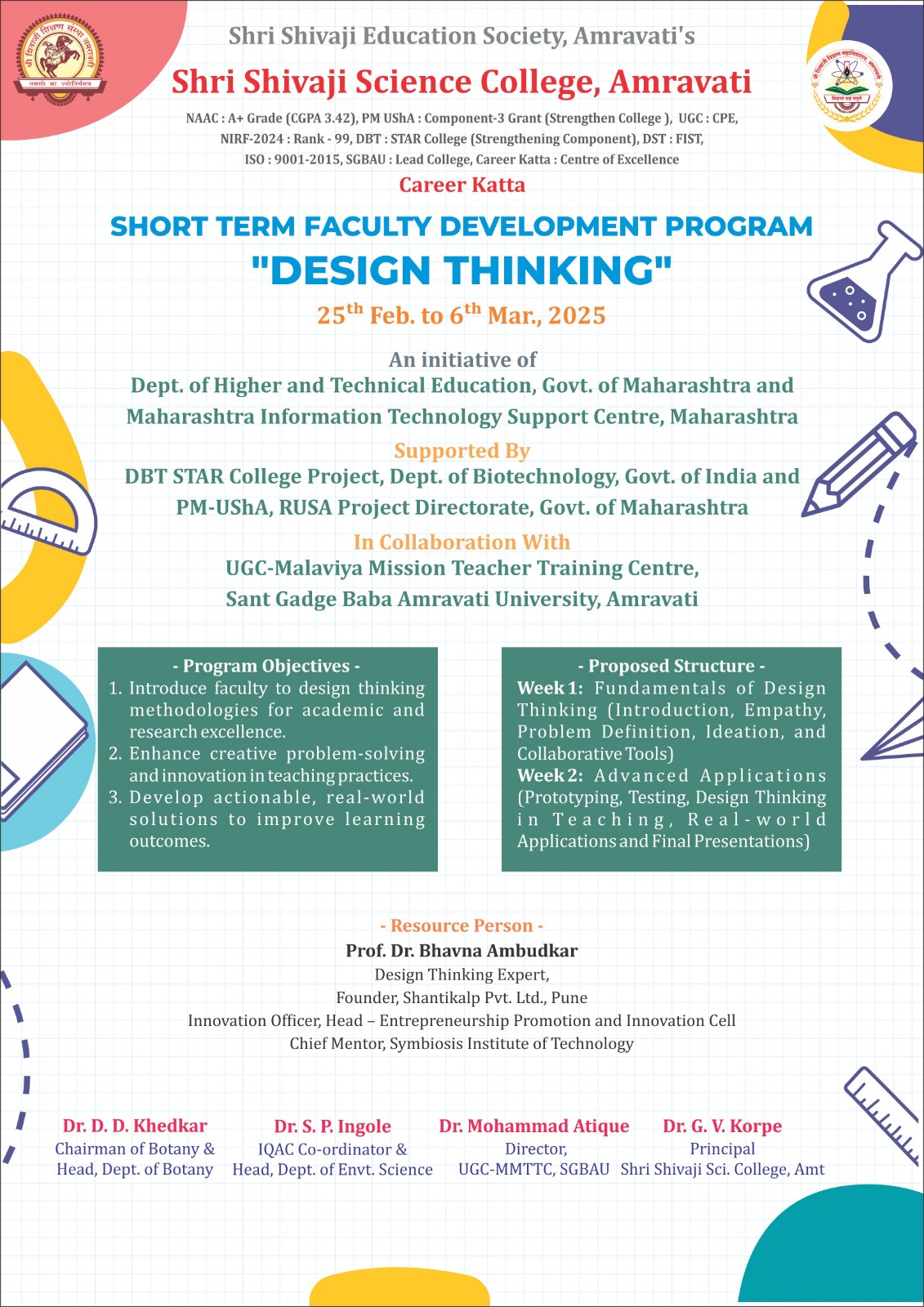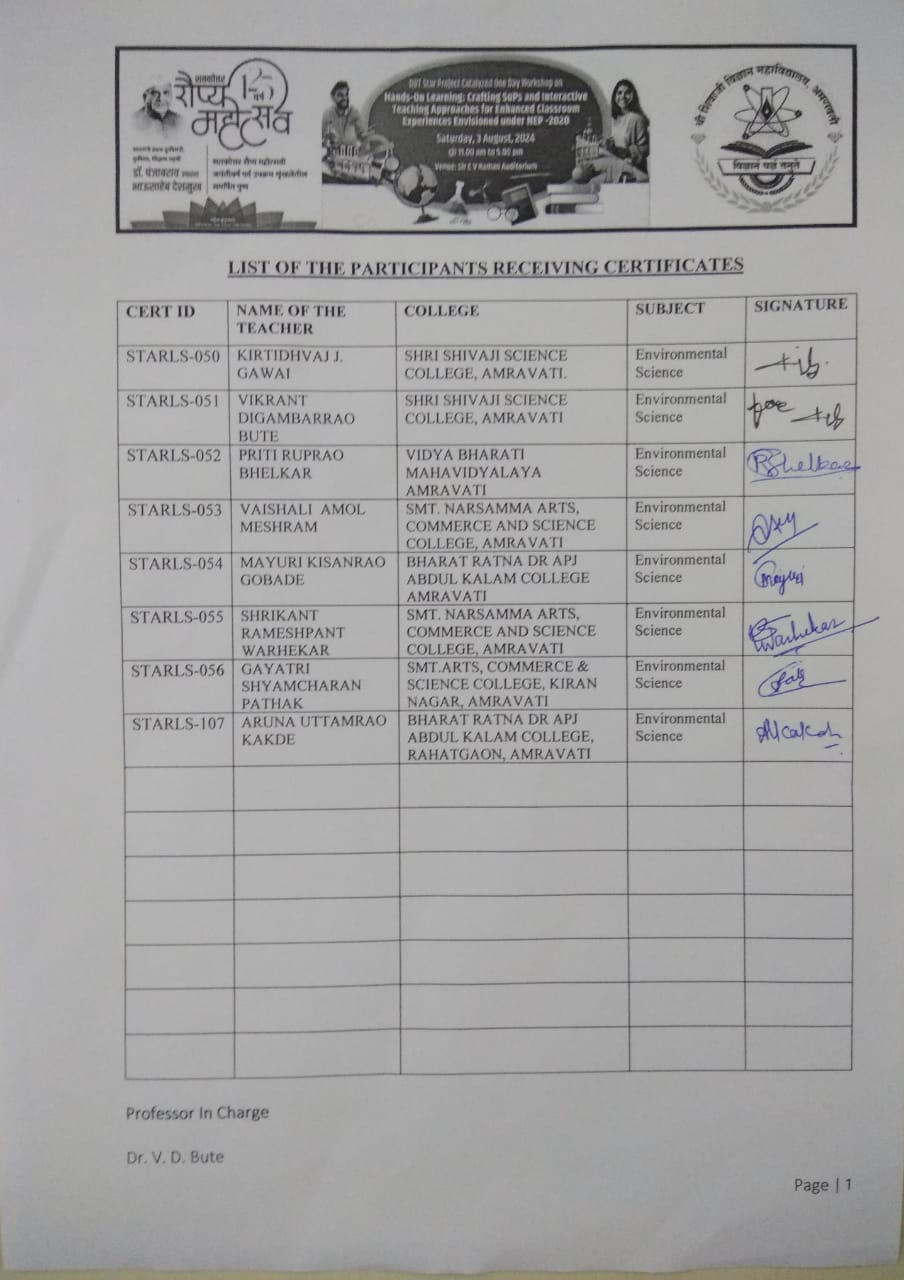SHRI SHIVAJI SCIENCE COLLEGE, AMRAVATI
DBT STAR COLLEGE PROJECT ACTIVITY
ACTIVITY REPORT

Hands-on Learning: Crafting SOPs and Interactive Teaching Approaches for Enhanced Classroom Experiences Envisioned Under NEP
Activity Dates: 03/08/2024
Type of Activity: Faculty Development Program
Organizing Department: Department of Environmental Science
Program Coordinators: Dr. S.P. Ingole
Head of the Department: Dr. S. P. Ingole
External Collaborator (if any): Brijlal Biyani Science College, Amravati
Objectives:
- 1. To align the curriculum with the NEP 2020 guidelines, which emphasize multidisciplinary learning, flexibility, experiential learning, and skill development.
- 2. To ensure that the syllabus reflects the latest developments in environmental science, including climate change, biodiversity conservation, sustainability, and green technologies.
- 3. To design course structures that cater to both academic excellence and practical application, preparing students for real-world environmental challenges.
- 4. To integrate research, internships, and fieldwork as core components of the curriculum.
- -----
No of Beneficieries: 13
Classes Involved: Teachers of Environmental science
Venue of the Activity: P.G. Environmental Science Labs
Activity Report:
On 3 August 2024, the Department of Life Sciences at Shri Shivaji Science College, Amravati, in collaboration with Brijlal Biyani Science College, Amravati, hosted a day-long workshop entitled "Hands-on Learning: Crafting SOPs and Interactive Teaching Approaches for Enhanced Classroom Experiences Envisioned Under NEP." This workshop aimed at enhancing the pedagogical approaches of science educators in line with the National Education Policy (NEP) and fostering a deep understanding of how to craft Standard Operating Procedures (SOPs) for a more effective and engaging classroom experience.
The event was attended by faculty members from the life sciences disciplines, including Botany, Zoology, Environmental Science, Microbiology, and Biotechnology. It was structured into multiple sessions, each aimed at addressing specific components of the NEP and the creation of SOPs that would serve as a teaching manual for educators.
Inaugural Session: General Implementation of the NEP Syllabus
The main objective of this Workshop was to create awareness about the newly launched National Education Policy-2020 amongst teachers and to familiarize them with the skills to help them understand its nuances, curriculum changes, shift in the pedagogical skills and its implementation for the 360 degree holistic development of its stake holders, the students. The programme was coordinated by Dr. Rekha Maggirwar , Department of Botany. President of the workshop was Hon. Principal, Dr. G. V. Korpe, Shri Shivaji Science College, Amravati.
The programme started with inaugural function graced by Hon. Principal Dr. D. S. Dhote, Brijlal Biyani Science College Amravati as resource person of the workshop. The programme started with welcome address by Dr D. D. Khedkar, Professor & Head, Department of Botany, followed by felicitation of guest by Dr. G. V. Korpe. Inaugural speech was delivered by Dr. D. S. Dhote. He highlighted on the different challenges and the role of the teachers that were highlighted on the NEP 2020.He mentioned that, NEP 2020 has put in place systematic reforms that would help in restoring the high respect and status for teachers. NEP emphasizes to move students away from rote learning, and raise literacy and numeracy skills at the foundational level. Following that Dr G. V. Korpe mentioned in his talk about the importance of curriculum and the problem faced by teaching and learning. The inaugural function was ended with vote of Thanks by Dr. N. H. Sahare, Professor & Head, Department of Botany, Brijlal Biyani Science College Amravati.
This inaugural session provided a comprehensive overview of the goals of NEP, setting a strong foundation for the following subject-specific discussions. Dr. Dhote concluded by stressing the importance of collective effort from all educators to ensure successful implementation of the NEP guidelines at the grassroots level.
Subject-Specific Session :
After Dr. Dhote’s plenary session, participants broke into subject-specific groups for deeper discussions on crafting SOPs and implementing the NEP in their respective fields.
The faculty members leading these sessions provided insights into curriculum design, teaching strategies, and the creation of assessment frameworks.
Environmental Science Session – Led by Dr. S.P. Ingole:
In the 2nd technical session, teachers of Environmental Science assembled in the P.G. Lab of Environmental Science. The contents of the NEP syllabus for theory & practical of B.Sc. & M.Sc. were discussed thoroughly. The titles & contents of the theory syllabus for major & minor were discussed & reviewed. The titles & contents of the practical syllabus for major & minor were also reviewed & discussed. Model questions for the question paper were reviewed. Contents of Practical for SEC etc. were decided. Experiments for Practical were decided & confirmed. Sequence of the chapters, sequence of the titles in each chapter were also reviewed in the syllabus. Grammatical & spelling corrections were also seen. GOEC paper was decided, Books for references were discussed. Dr. Ingole madam suggested the need of job oriented, interesting & easy syllabus of environmental science based on experiential and participative learning. Dr. Mangale sir suggested that each point or subtitle in each unit should be clearly mentioned. What is expected in that point or subtitle should also be clear to avoid any confusion and uniformity in teaching and also in question paper setting. He added that it will help to decide the depth of teaching of that particular title. Dr. Narnawre (Meshram) madam discussed about number of units to be included, titles of the units to be included in the paper of research methodology which is newly added in M.Sc.I. Dr. Warhekar took initiative to ask about how many lectures should be allotted to each unit. Dr. Gawai suggested the addition of the unit with title Review of literature in the paper of research methodology. Mr. Bute raised the issue of inclusion of local environmental problems in the syllabus. Dr. Aruna Kakde (Gawai) expressed the concern about maintaining the consistant number of students in IInd year as there is facility of changing the major subject in B.Sc.II. and suggested to prepare the syllabus attractive. It was decided to prepare & publish book of Semester I & II of B.Sc. For that purpose, Units of B.Sc. I (Sem.-I & II) were distributed among teachers. As per the unit preparation of the content is also distributed among the teachers.A group photo was taken and after high tea certificates were distributed to the participants.The detail discussion of the workshop will enhance student engagement & foster holistic development.
Outcomes:
- • Development of Standardized Operating Procedures (SOPs): The workshop successfully produced detailed SOPs for Theory, practical, lab, and field-based teaching across subjects like Botany, Zoology, Environmental Science, and other life sciences. These SOPs ensure a uniform and effective teaching methodology, making it easier for educators to implement NEP’s guidelines.
- • Enhanced Teacher Collaboration: Educators from multiple institutions and disciplines worked together to share best practices, ideas, and innovative teaching methods. This collaborative effort helped in creating an interdisciplinary approach to teaching, aligned with NEP’s vision of holistic education.
- • Incorporation of Hands-on Learning Approaches: Teachers were equipped with practical strategies for incorporating hands-on and field-based learning into their syllabi. By focusing on real-world applications, the workshop helped educators align their teaching with NEP’s emphasis on experiential and skill-based education.
- • Clarity in NEP Implementation: The workshop provided educators with a clear understanding of how to effectively implement the NEP syllabus in their respective subjects. Expert-led discussions and lectures gave teachers actionable insights into restructuring their courses and assessments to align with NEP’s vision.
- • Strengthening of Student-Centric Pedagogy: The outcomes of the workshop emphasized a shift from traditional, lecture-based teaching to a more interactive, student-centered approach. This aligns with NEP’s focus on fostering critical thinking, problem-solving, and inquiry-based learning, which are essential for developing well-rounded, competent students.
Photos:
 Teachers in Discussion |  Group Photo |
 Blank |  Blank |
 Blank |  Blank |
Attendance Sheet:
 |